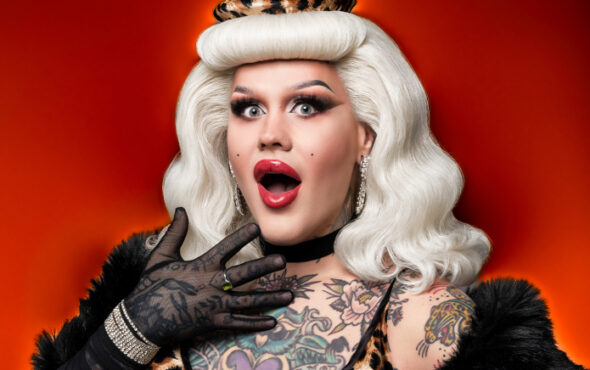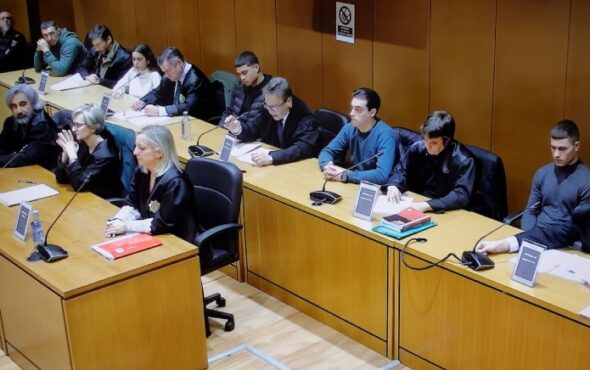
A Hungarian law banning the promotion of homosexuality in schools came into force on Thursday, as the European Parliament voted to use its legal and economic muscle to pressure the east European nation to repeal the legislation.
The Thomson Reuters Foundation spoke to four people from Hungary’s LGBTQ+ community about the impact of the ban:
Andrea Terez Sztraka, LGBTQ+ education charity worker
“Many of my homosexual friends are depressed,” said Sztraka, 29, of the Getting to Know LGBT People (GTK) programme, which has run volunteer-led sessions challenging homophobia and transphobia in Hungarian schools since 2000.
“They are scared. They don’t know how they can live their lives and many of those who were planning to have children feel hopeless.”
The programme used to receive about 40 invitations a year from schools, reaching up to 1,500 students.
But that changed in 2019 when state-run media ran disparaging stories about GTK and far-right groups began to picket its meetings, hurling abuse at attendees, Sztraka said.
A photo of a teacher who attended a GTK meeting about countering the bullying of LGBTQ+ children was published online, along with allegations that he was “corrupting children” and spreading “LGBTQ propaganda”.
“Teachers became scared to invite our programme because they feared the consequences,” Sztraka said.
Imre Marton, volunteer LGBTQ+ educator
“Hate is elementary now in the government,” said Marton, a 53-year-old GTK volunteer.
“The LGBT+ community is the next enemy and I do not want to be part of this anymore. I feel ashamed to be Hungarian.”
Marton only realised he was gay after fathering three children and a period of almost 15 “lost” years, which included so-called conversion therapy – a practice that aims to change a person’s sexual orientation or gender identity.
If the GTK programme had existed then, “everything would have been clearer”, he said in emailed comments.
Marton found the opportunity to support vulnerable LGBTQ+ kids – and change people’s minds about gay people – life-affirming. But he fears the new law will force people back into the closet.
“We will go back to the dark days of communism, when homosexuality ‘did not exist at all’,” he said. “I will also think twice about kissing my boyfriend on the street.”
“I hate my country. I am angry and desperate. The government generates and supports hate. In my country, I’m criminalised as a paedophile … I don’t want to live here anymore.”
Daniella, transgender woman now living abroad
Some LGBTQ+ Hungarians have already left, including Daniella, a trans woman who declined to publish her real name for security fears, and moved to Germany’s capital Berlin last year.
“I did not want to go through this transition and get hormone replacement therapy in a deeply transphobic and homophobic country,” she said.
A 40-year-old blockchain systems engineer, Daniella began to feel alienated from Hungary after visiting New York.
That feeling grew as laws were passed last year banning same-sex couples from adopting and preventing trans citizens from legally changing their birth gender on official documents.
“It was like the government was getting more and more hostile to LGBT+ people,” she said. “For years before, it was all about Islamophobia and refugees. Nowadays, LGBT people are the scapegoats.”
Imre Zsoldos, accountant One of Imre Zsoldos’s first memories is of his father’s rage when he came home to find him watching “Fiddler on the Roof”, a film about east European Jewish life in the early 20th century.
“He got very angry because I didn’t close the curtains and what would happen if people on the street saw it? They would know we were Jews!,” said 40-year-old Zsoldos.
“We were raised in the fear that no one can know about us being Jewish and later on (I felt that) no one can know that I am gay.”
Zsoldos said he had “lived my life in secret” under the motto that “being gay is something best done between the four walls of the home”.
“Now I fear that I have to decide between starting to be a loud activist or moving out of the country,” he said.
Reporting by Arthur Neslen
GAY TIMES and Openly/Thomson Reuters Foundation are working together to deliver leading LGBTQ+ news to a global audience


